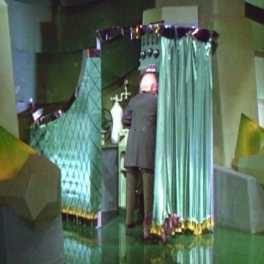The politics of science is about more than just funding and science-based policy decisions: governments, and in particular the US Federal Government, are into science education in a big way, whether you like it or not. In fact, it's hard to see how the US government can avoid being in the science education business, even if it's not setting national standards for local schools: when people want to know about swine flu, they turn to the US Centers for Disease Control; the major science agencies, the NSF, NASA, NIH, DOE, are obligated (sometimes by law) to explain to the public how billions of dollars of research funds are being spent, and many of the US national parks have visitor centers that explain the science behind the parks' impressive natural wonders.
Why, anybody can have a brain. That's a very mediocre commodity. Every pusillanimous creature that crawls on the earth or slinks through slimy seas has a brain. Back where I come from, we have great universities, seats of great learning where men go to become great thinkers, And when they come out, they think deep thoughts, and with no more brains than you have. But they have one thing you haven't got: a diploma.- The Wizard of Oz to the Scarecrow


Over at
Wired, read about gadgets losing their luster:
When Arthur C. Clarke went to the great geosynchronous orbit in the sky last year, he left behind a huge legacy, not least of which was a quote oft cited by Silicon Valley visionaries and wannabes. "Any sufficiently advanced technology," the sci-fi master wrote in 1962, "is indistinguishable from magic."
I thought of Clarke's observation recently while I was playing with a Flip MinoHD camcorder. It's a stripped-down device with a footprint smaller than an Altoids tin, yet it holds an hour of video (in high definition!) and even has 2X zoom.
Richard Lewontin has
a piece well worth reading in the New York Review of Books:
There are, however, occasions on which there are orgies of idolatrous celebrations of the lives of famous men, when the Suetonian ideal of history as biography overwhelms us. For Darwinians, 2009 is such a year.
He wanders around a bit, looking at the history of evolutionary ideas and why 19th century industrial capitalism might have contributed to the
Origin success as a runaway best-seller.
 Melville on Science vs. Creation Myth
Melville on Science vs. Creation Myth Non-coding DNA Function... Surprising?
Non-coding DNA Function... Surprising? Yep, This Should Get You Fired
Yep, This Should Get You Fired No, There Are No Alien Bar Codes In Our Genomes
No, There Are No Alien Bar Codes In Our Genomes













